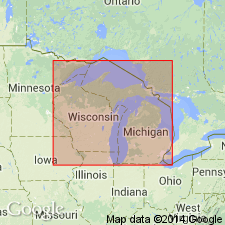
- Usage in publication:
-
- Plymouth ferruginous chert member
- Modifications:
-
- Named
- Dominant lithology:
-
- Chert
- Slate
- Quartzite
- AAPG geologic province:
-
- Wisconsin arch
Summary:
Named the Plymouth ferruginous chert member of the Ironwood formation for Plymouth mine, Gogebic Range, MI. Consists of mainly wavy-bedded granular and fine-grained ferruginous chert with some slate. A thin cherty quartzite is sometimes present at the base. Unit is the basal member of the Ironwood formation. It unconformably overlies the Palms formation and unconformably underlies the Yale member of the Ironwood formation. The Plymouth is of Precambrian age.
Source: GNU records (USGS DDS-6; Reston GNULEX).
- Usage in publication:
-
- Plymouth Member*
- Modifications:
-
- Revised
- AAPG geologic province:
-
- Wisconsin arch
Schmidt, R.G., and Hubbard, H.A., 1972, Penokean orogeny in the central and western Gogebic region, Michigan and Wisconsin: [unknown]
Summary:
Revised the Plymouth to the Plymouth Member of the Ironwood Iron-Formation. Consists of thick-bedded, granular, cherty iron-formation with a basal 1 to 5 foot thick algal chert and jasper bed. The main part of the unit is wavy-bedded cherty iron-formation. It overlies the Palms Formation and underlies the Yale Member of the Ironwood. The Plymouth is of Precambrian X age.
Source: GNU records (USGS DDS-6; Reston GNULEX).
For more information, please contact Nancy Stamm, Geologic Names Committee Secretary.
Asterisk (*) indicates published by U.S. Geological Survey authors.
"No current usage" (†) implies that a name has been abandoned or has fallen into disuse. Former usage and, if known, replacement name given in parentheses ( ).
Slash (/) indicates name conflicts with nomenclatural guidelines (CSN, 1933; ACSN, 1961, 1970; NACSN, 1983, 2005, 2021). May be explained within brackets ([ ]).

